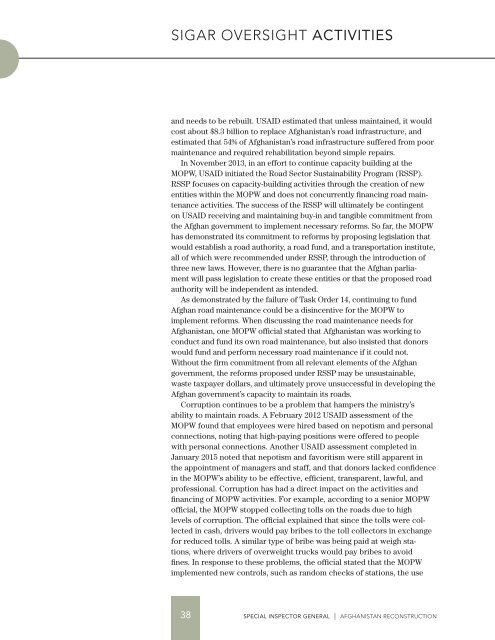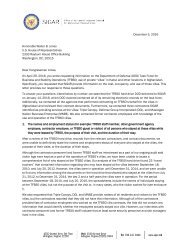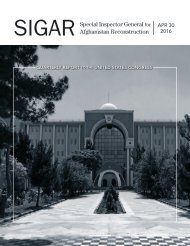SIGAR
2016-10-30qr
2016-10-30qr
You also want an ePaper? Increase the reach of your titles
YUMPU automatically turns print PDFs into web optimized ePapers that Google loves.
<strong>SIGAR</strong> OVERSIGHT ACTIVITIES<br />
and needs to be rebuilt. USAID estimated that unless maintained, it would<br />
cost about $8.3 billion to replace Afghanistan’s road infrastructure, and<br />
estimated that 54% of Afghanistan’s road infrastructure suffered from poor<br />
maintenance and required rehabilitation beyond simple repairs.<br />
In November 2013, in an effort to continue capacity building at the<br />
MOPW, USAID initiated the Road Sector Sustainability Program (RSSP).<br />
RSSP focuses on capacity-building activities through the creation of new<br />
entities within the MOPW and does not concurrently financing road maintenance<br />
activities. The success of the RSSP will ultimately be contingent<br />
on USAID receiving and maintaining buy-in and tangible commitment from<br />
the Afghan government to implement necessary reforms. So far, the MOPW<br />
has demonstrated its commitment to reforms by proposing legislation that<br />
would establish a road authority, a road fund, and a transportation institute,<br />
all of which were recommended under RSSP, through the introduction of<br />
three new laws. However, there is no guarantee that the Afghan parliament<br />
will pass legislation to create these entities or that the proposed road<br />
authority will be independent as intended.<br />
As demonstrated by the failure of Task Order 14, continuing to fund<br />
Afghan road maintenance could be a disincentive for the MOPW to<br />
implement reforms. When discussing the road maintenance needs for<br />
Afghanistan, one MOPW official stated that Afghanistan was working to<br />
conduct and fund its own road maintenance, but also insisted that donors<br />
would fund and perform necessary road maintenance if it could not.<br />
Without the firm commitment from all relevant elements of the Afghan<br />
government, the reforms proposed under RSSP may be unsustainable,<br />
waste taxpayer dollars, and ultimately prove unsuccessful in developing the<br />
Afghan government’s capacity to maintain its roads.<br />
Corruption continues to be a problem that hampers the ministry’s<br />
ability to maintain roads. A February 2012 USAID assessment of the<br />
MOPW found that employees were hired based on nepotism and personal<br />
connections, noting that high-paying positions were offered to people<br />
with personal connections. Another USAID assessment completed in<br />
January 2015 noted that nepotism and favoritism were still apparent in<br />
the appointment of managers and staff, and that donors lacked confidence<br />
in the MOPW’s ability to be effective, efficient, transparent, lawful, and<br />
professional. Corruption has had a direct impact on the activities and<br />
financing of MOPW activities. For example, according to a senior MOPW<br />
official, the MOPW stopped collecting tolls on the roads due to high<br />
levels of corruption. The official explained that since the tolls were collected<br />
in cash, drivers would pay bribes to the toll collectors in exchange<br />
for reduced tolls. A similar type of bribe was being paid at weigh stations,<br />
where drivers of overweight trucks would pay bribes to avoid<br />
fines. In response to these problems, the official stated that the MOPW<br />
implemented new controls, such as random checks of stations, the use<br />
38<br />
SPECIAL INSPECTOR GENERAL I AFGHANISTAN RECONSTRUCTION




